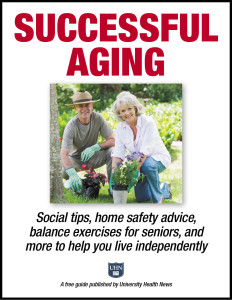Independent Living to Dependent Living: A Staged Approach
Anticipating how your needs will change with aging can be daunting, but taking measures to plan for those changes can make the eventual transition from independence to dependence smoother. Careful planning can also potentially prolong your independence, allowing for more of your needs to be met inside your home.
Consider taking a staged approach to your elder care. Here are five possibilities to ponder:
- Living at home: Assess your limitations and how they are impacting your daily routine. If mobility is an issue, consider assistance devices such as a cane or walker. Minimize your fall risk by installing handles or railings by steps and in bathrooms. If steps are an obstacle or hazard for you or if you use a scooter or wheelchair, consider installing ramps where needed. Remove loose rugs and arrange furniture to clear easy paths between rooms.
Retain Your Independence!
Download this expert FREE guide, Successful Aging: Social tips, home safety advice, balance exercises for seniors, and more to help you live independently.
Learn exercises and activities for seniors to keep you safe and let you age in place.
- Living at home with outside help: If the daily tasks of cleaning and meal preparation are beginning to become too taxing, consider hiring outside help for assistance. Ask friends for recommendations or use an agency to find some help. If you’re relying on a personal recommendation, you should interview the candidate, ask for photo identification (ID), and check at least three references. If you’re using an agency, you should ask the agency what screening processes they use to hire help and whether they provide a substitute if an employee is unable to come for a shift.
- If you do not need someone for a full day, consider sharing the services of a helper or aide with someone in your building or neighborhood so that each of you receives three to four hours of help during the day. You can also contact your local community center to obtain information on Meals on Wheels or other meal delivery services in your area.
- Living at home with a home health aide: When your needs for assistance begin to include bathing, toileting, feeding, or dressing changes, you will want to find a home health aide. As with any outside hired help, you’ll want to screen any potential candidates. Ask a friend or family member to assist you with this if you are not using an agency and request photo ID and check references. Ask whether they’re certified in CPR and have been certified as a home health aide.
- If a candidate does not have home health aide certification it does not mean that they do not have home health or medical experience, but it is even more important that you check references to be certain they are up to the task of meeting your needs.
- Assisted living: If staying in your home is no longer an option or if you want to make a move to a place with greater resources before your need for help becomes too great, an assisted living facility might be the best fit for you. Assisted living facilities typically offer living accommodations where you can remain as independent as you wish, but can access assistance with everything from meals to medication management when you are ready for it.
- Finding the right place for you is important since this will be your new home. Visit as many places as possible before you choose. Ask other residents about their experience. Asking the management about amenities (e.g., social events and transportation), safety precautions or security, visitation policy, and costs will help you determine the best fit.
- A nursing home: Choosing a nursing home is often left to a patient’s family; however, some seniors opt to do their own research before the time has come to make a move into a nursing home. Many assisted living facilities have nursing home accommodations as well. You may want to factor that into your decision when choosing an assisted living facility. Some doctors provide care at nursing homes so asking your doctor if he or she does and, if so, at which homes can be a good option. It is also wise to ask about staff to patient ratios to be certain that there are an adequate number of nurses or nursing aides.
Finally, ask whether the nursing home is accredited by the Joint Commission for Long Term Care and/or the Centers for Medicare and Medicaid Services to ensure that the facility has met certain standards for care. You and your family will both have peace of mind if you do your due diligence and find a nursing home you have confidence in and that meets all of your needs.
For further reading:
- “Caring for Elderly Parents at Home? Consider These Options“
- “Elderly Activities: Managing the Day-to-Day Issues
- “Elderly Health Care Issues: Aging and Mental Well-Being“
Originally published February 2016 and updated.
The post Independent Living to Dependent Living: A Staged Approach appeared first on University Health News.
Read Original Article: Independent Living to Dependent Living: A Staged Approach »
Powered by WPeMatico



